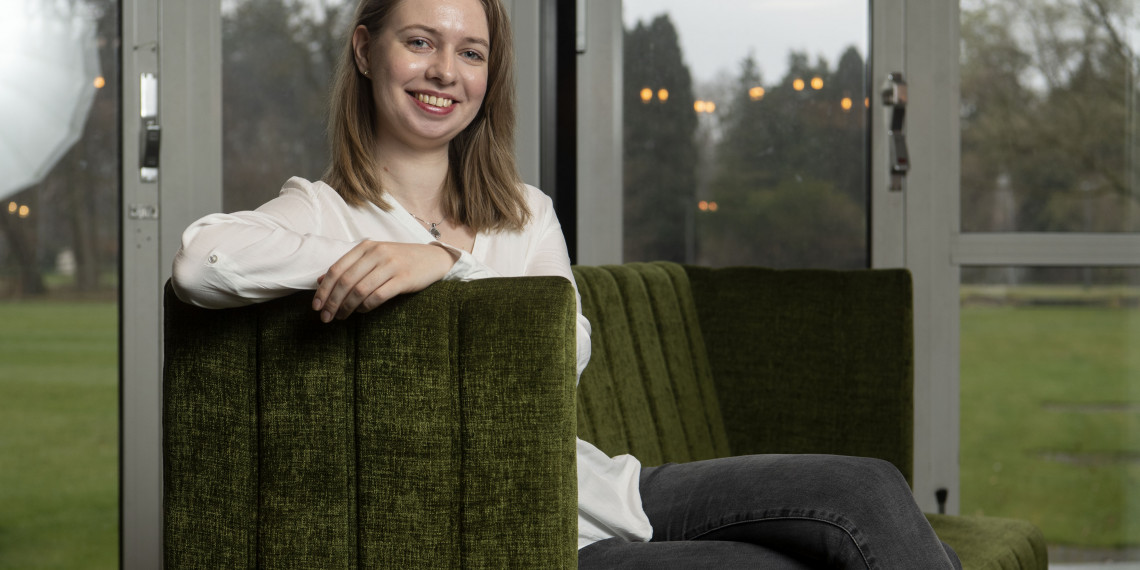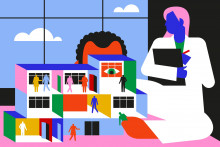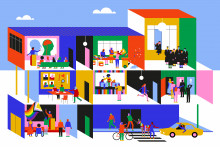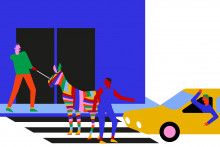How do you experience being on the autism spectrum?
Groenenboom: ‘I was diagnosed with autism two years ago. I was first diagnosed with clinical depression several times in only a few years, and so my therapist thought there might be more to it than only stress factors. I don’t mind being on the spectrum, it’s not something I want to hide. It’s something you might even say I’m proud of. However, it was difficult to realize that the hurdles I had been experiencing aren’t going to go away just by improving my mental health. They are something I will have to deal with for the rest of my life. Since my diagnosis, I have been educating myself and searching for the positive sides of being on the spectrum. Because it is not a burden, there are many beautiful things connected to it as well.’
What is autism?
Autism is a lifelong developmental disorder which affects how people communicate and interact with the world. Being autistic does not mean you have an illness or disease. It means your brain works in a different way from other people. According to the World Health Organization about one in 100 children has an autism spectrum disorder, but these numbers differ per country.
‘Autism is atypical development,’ explains Annemarie Kolkman - ten Hoopen, one of the experts supporting people with autism at the UT. ‘When growing up, most children first acquire social skills before learning cognitive skills. For autistic people, however, it is the other way around: they first develop cognitive skills. Autistic people are often considered to not be social, but in our experience that is not the case.’
It is called ‘autism spectrum’ because each person experiences it differently. How does autism affect you?
‘I have a lot of sensitivities that neurotypicals don’t have and don’t always understand. For example, I’m wearing special earplugs that filter everything except the spoken word. The first time I put them on, I thought ‘this is how a neurotypical must feel’. I was finally not distracted by noises, by every passing car, I no longer had to be in physical pain when sound was too loud or too sudden. Now I don’t go out without them. Before my diagnosis, I thought this would be something I just have to deal with, but it was very tiring and frustrating, because you get overstimulated. Since my diagnosis, I’ve been able to fully recognize my sensitivities and insensitivities. For example, food and eating has always been a bit of a hurdle for me. I don’t necessarily feel hunger as hunger, I experience it as tiredness, and so sometimes I’d take a nap instead of eating something. Getting diagnosed helped me recognize these signals, and accept that my body’s signalling works different from what you are taught as a child.
‘I have worked with consultants to better understand how neurotypicals think’
Autism also affects communication. There is a big difference in what autistics see as logical, consequential and obvious. I have worked with consultants to better understand how neurotypicals think. Many people try to read between the lines, which is funny because with autistics there is nothing between the lines, but people generally don’t expect you to say literally what you are thinking. It can be seen as rude. I have learnt to pad my communication with socially acceptable ways of expressing oneself, but having to think about how to say every little thing is very tiring. I put in all the effort to make sure that the communication goes well. It will take a lot of education to make sure that neurotypicals take that into account, and hopefully start meeting us halfway.’

You mentioned that autism also comes with positive aspects. What do you perceive as the positive sides of being on the spectrum?
‘I’d say I’m an extremely creative person. Per definition, I’m an out of the box thinker – because I just can’t think inside a box. I’m very accepting of others. I never think of anyone as being weird, although sometimes I think people can be inconsiderate and unsympathetic. Autistic people are not seen as empathic, but actually we can be very sensitive to other people’s emotions. Most autistics want other people to be happy. My emotions can be very intense, which can be overwhelming but also positive because I can experience art and culture more intensely, for example. Autistics are usually also very passionate about specific subjects. We call these special interests or spins for short. This can help us be very good at our jobs. If we have an environment where we feel physically and emotionally comfortable, we can be very loyal and passionate employees. I feel that many people don’t see that, they only see autistic people as potentially problematic.’
Do you consider autism to be a disability? How would you refer to it?
‘We usually refer to autism as a different neurotype. It’s not only a disability, it can be beautiful and it can be put to good use. Also, disability doesn’t have to be a bad word. It doesn’t refer to the person, but to the environment which is not optimal for the person’s competences. We should stop looking at disabled people as if they are cursed. We can lead perfectly happy lives. Maybe not standard lives, but we should not strive to make everyone standard – that would be quite boring.’
How does the University of Twente support you at the moment?
‘I have been provided help at the UT. I have reached out to the Autism Consultation Hour and I go to my study advisor for advice on how to communicate with people at the university. I had to learn this social padding. I like to get to the point, not waste people’s time, but I don’t want to make people uncomfortable, so I have been learning about how neurotypicals think and prefer to communicate.’
Autism support at the UT
The University of Twente provides Autism Consultation Hour dedicated to students with autism and anyone who has questions about autism. It takes place at the department of Student Affairs Coaching & Counselling every other week. ‘Anyone with questions about autism can come,’ say Roos te Riele and Annemarie Kolkman - ten Hoopen, the two main autism councilors providing help at the UT.
‘Most of the time we receive questions related to planning,’ informs Te Riele. ‘Students have to study, but they also have a social life and household chores. In many cases, they are able to make a good schedule but then they don’t follow up on it. We try to give them the tools to stick to their planning and navigate university life in general. During every consultation hour, we generally have four to five appointments. Many students come back several times, but after a few visits they have all the tools and knowledge they need.’
There are no records of how many students with autism are at the UT. ‘We do not have a clear picture how many students with a form of autism or similar issues are studying at UT,’ says Disability Services Coordinator Carla Bruynel. ‘I cannot give any indication of any percentage or numbers, but we know that technical universities attract more autistic people than other institutions.’
Is there anything else the UT could do to help you and other autistic people?
‘I have also discussed this with my friends. One suggested it would be helpful to have a mentor, someone you can meet at the start of the day to discuss your planning for the day. Autistics in general have problems with realistic planning. It would be great to have support for executive functioning more readily available, because most autistics don’t want to be a burden and aren’t comfortable asking for help.
‘The university should provide general education on what autism means’
Secondly, the university should provide general education on what autism means. I didn’t even know myself when I was diagnosed. People often ask me if I really got the right diagnosis. This question can be painful and it is rooted in this idea that autism is a clearly visible deficit. Because of that, autistics often suffer from imposter syndrome, wondering for years whether they indeed got the right diagnosis, and being scared to communicate their boundaries and needs. If everyone knew, and accepted, that autism is just a different neurotype, it would take some of the pain away. It would make it easier to be autistic in a non-autistic world.’
Does your direct environment – and people at the UT – know that you are autistic?
‘I wasn’t ready to tell everyone I was autistic, because if people know they might suddenly see you as less capable. I am more open about it with my friends, but I still don’t tell professors. So I’m extremely anxious about this interview and how it will impact things. I’m wondering how people will treat me after this. Based on my experiences, it will change how they see me and treat me. Suddenly they start wondering if they should behave differently, it makes them a bit anxious and it is not a pleasant experience. Ironically, people also forget about the diagnosis after a while. I’ve been learning a lot about manoeuvring the sharing of my diagnosis, but it is still taxing.’
‘I wasn’t ready to tell everyone I was autistic. ... Based on my experiences, it will change how they see me and treat me’

What can people do to make your life a bit easier?
‘I’d like to have the choice to receive a small-scale education. Large lecture halls can be overwhelming for me. I struggle with switching tasks. For example, if there is a fifteen minute break, a neurotypical gets recharged and then goes back to the class. I take more time to start relaxing, and then it is very difficult to switch back. I miss a safe space, some comfort zone that is sound proof and protected from distractions. It would be nice to have a space to recharge. And a space where I can meet up with other autistics.
With the Autism Awareness Day coming up, I’d say to people: educate yourselves. Read one account of an autistic’s experience in life and realize how different it is from your experiences. Secondly, please stop telling people that bring up the courage to share their diagnosis that they don’t look autistic, it’s not a compliment. Finally, please refer to us as autistics, not people with autism. Imagine if we’d start calling you person with neurotypicalism, I doubt many people would feel appreciated for who they are.’
We first got in contact because you felt that autism and neurodiversity should receive more attention – also in media. Why is that important to you?
‘It's important to me to talk about neurodiversity, because many people are suffering instead of living fulfilling and productive lives that they could lead if society realized they need a different environment to thrive. We will never get those changes and such an environment if people don’t become aware of neurodiversity.’
Neurodiversity plan
The topic of autism and neurodiversity is also covered in an action plan that the UT Diversity, Equity & Inclusion (DE&I) Office is currently developing. ‘We choose to refer to neurodiversity as a given,’ states UT DE&I Officer Sterre Mkatini. ‘We all have different needs. We should all have different opportunities so that everyone has the option to choose the best solution for themselves. This could mean offering, for example, more quiet spaces, flexibility in modules and possibilities to work or study from home more or rather less often. The options should be offered and then it is up to everyone to choose if they want to use them or not. Yes, some people will still require tailormade solutions, but we should normalize having different options so that everyone can navigate work and studies.’








